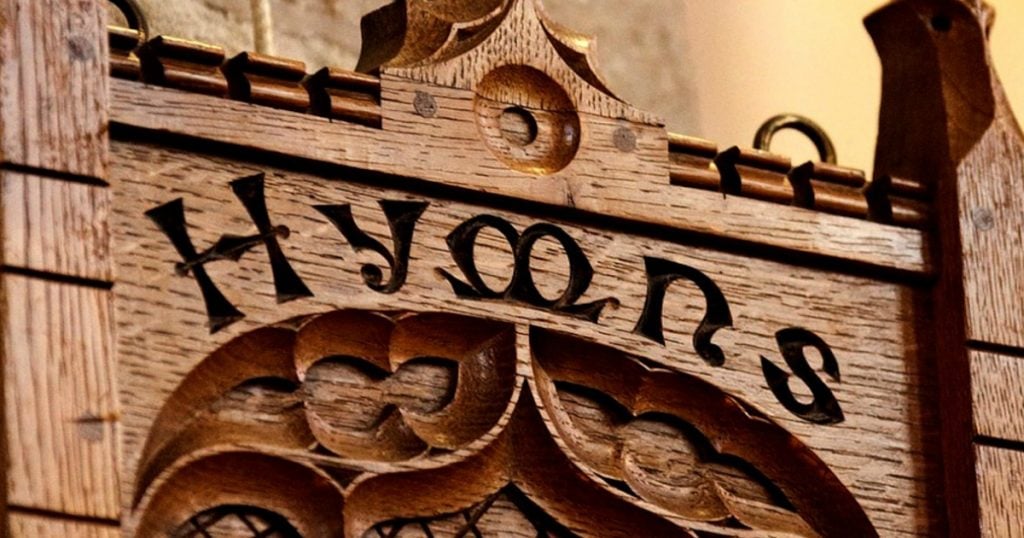As a Lead Pastor, Mike Leake has a special appreciation for hymns. And while he enjoys singing them, here he reviews 6 classic hymns he feels teach Christians bad theology.
In his book, Doxology and Theology, Matt Boswell says this:
When the church is gathered together in the name of God, only singing which glorifies Him is appropriate. We don't sing corporately because it was our idea. We sing because it was God's idea for His people. Since it is God who has commanded us to sing, it is God who will also determine what kind of songs we will sing. We are to sing to Him and for Him. Our songs are not meant to be entertainment, or a distraction from God. (Boswell, 7)
This means we sing for the purpose of pleasing God and to edify one another. And God is pleased and we are edified by the truth of Scripture. An implication of this is that what matters most in the songs we sing as a gathered church is not whether or not we like the songs but whether or not they share biblical truth accurately.
RELATED: 14 Reasons Why We Should Go Back To Using Hymnals In Worship
There are a few classic hymns which I believe have a tendency to teach us bad theology. I do not believe in the long term they edify the body. I love to sing some of these songs, they have sentimental appeal. But there are certain things taught within these six hymns which give me pause.
6 Hymns Teaching Bad Theology

Credit: ©Unsplash
1. “He Lives”
This hymn, which we often sing when celebrating the resurrection, was penned out of frustration by Alfred Ackley. He was discouraged by a liberal preacher who said the resurrection did not matter. To Ackley it did matter and his personal testimony bore truth of the risen Lord.
There is much to commend in this hymn. We must have a living and active faith with the living Lord. And it is true that our testimonies are personal. But Ackley's apologetic method puts us in shaky waters. Consider the lyrics of He Lives and now ask yourself whether or not someone hearing voices telling them to do something unthinkable could not just as easily fit. How does he know the voices are real? He knows because they live within his heart.
What we really need from our hymns is not a subjective declaration but firm trust that Christ lives because the Bible says he does. This hymn teaches us to ground our faith in subjectivity. You ask me how I know he lives...because the Bible says he does.

Credit: ©Unsplash
2. “Blessed Assurance”
This is such a beloved hymn, I'm confident I'll get angry comments on this one. But have you ever actually thought through the lyrics and compared them to your walk with Christ? When have you had perfect submission? Ever experienced perfect delight, this side of glory? All is at rest? Really?
RELATED: Church Pianists Perform Beautiful Impromptu Hymn Medley
Fanny Crosby co-wrote this with Phoebe Palmer. The two women were heavily steeped in Keswick theology and Higher-Christian life teaching. This is a theology which teaches that if a Christian can perfectly surrender their flesh to Christ then they'll experience perfect delight.
Dan Phillips outlines the problem with this theology about as well and succinctly as I've read:
The effect of all this was that I was constantly taking my spiritual pulse, constantly checking within, freezing up, paralyzed, spiraling down into deeper and deeper morbid introspection and depression. In the name of "looking to Jesus" (revealed in His Word) I was constantly looking to myself, within myself. (Phillips, The World-Tilting Gospel, 251-52)
So where do we get our perfect delight from? This hymn would say it comes from perfectly submitted. A naive reading of these words could drive us into ourselves to find assurance. But the Scriptures drive us to the finished work of Christ and not into analyzing the level of our submission. I love the thought of praising my Savior all the day long but the Keswick theology smattered through this hymn makes me think twice about what I’m singing.

Credit: ©Unsplash
3. “The Savior Is Waiting”
I don't prefer this hymn because it makes Jesus far too passive and puts the keys way too much in the hands of the sinner. As I read the New Testament I see Jesus working and wooing but I don't often see him waiting. Furthermore, I think this song doesn't really do justice to the omniscience of our Savior. This song puts Jesus in far too passive and unknowing of a role for my comfort.
Softly and Tenderly is, in my opinion, a much better portrayal. Here Jesus is pleading with sinners but he isn't nearly as passive and wondering about your response.

Credit: ©Unsplash
4. “Away in a Manger”
I could add a few other Christmas songs in here as well. I still haven't figured out where King Wenceslas is in the Bible, or what figgy pudding has to do with the incarnation. I understand that these are so sentimental that we must sing them at Christmas time, but the theology in some of them is cringe-worthy. Did the little Lord Jesus really not cry when he was awoken by a noisy cow? What we end up doing is sanitizing the incarnation. We end up with a Christ-child who isn't like any other baby who has ever existed. That's true, though, isn't it? Christ is absolutely unique. But he's not unique in this way. He is fully human. You better believe this little baby cried on that night in Bethlehem.

Credit: ©Pixabay
5. “My Country ‘Tis of Thee”
I could include a host of other patriotic songs here. And these are difficult to include because we are called to love the nation in which God has planted us. But there is an American exceptionalism present in so many of these patriotic hymns that fosters a love for a kingdom which rivals the kingdom of God. There is an aspect of prayer for the nation in many of these hymns as well which I would heartily approve. But I cannot get beyond the bad theology of American exceptionalism and for that reason, I believe they do more harm than good.
Do these songs lead us to believe that we have a deeper unity with our brothers and sisters in Christ from another nation, or that we are more united with those who share this land we call America? I fear it's the latter, and this isn't biblically helpful.

Credit: ©Pixabay
6. The songs that aren't in your hymnal.
There are hundreds of songs in our hymnals about the joys of the Christian life, and rightly so. But there is a great dearth of songs of lament. Well over one-third of the Psalms are those of lament. It is true that Christ has come. He is the answer and the fulfillment of many of those songs of lament. Yet, we still live on this side of a redeemed Eden. We still hurt. We still labor. Therefore we still lament. The lack of these songs teaches us an unhealthy theology that leaves open the door to embracing heresies like the so-called prosperity gospel.
We need these songs to round out our theology.
Mike Leake is the Lead Pastor at FBC Marionville in Marionville, Missouri. He is currently pursuing his M.Div. at Southern Baptist Theological Seminary. Mike is married to Nikki, and they have two children, Isaiah and Hannah. You can follow him on Twitter @MikeLeake.
Credit: Crosswalk
YOU MAY ALSO LIKE: 5 Things You Lose When You Give Up Your Hymnals






